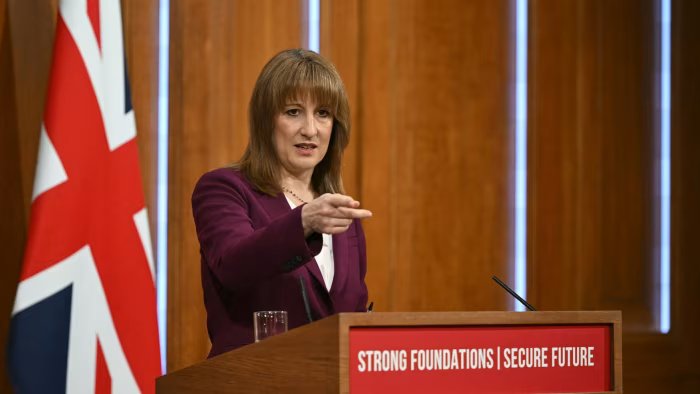Unlock the Editor’s Digest for free
Roula Khalaf, Editor of the FT, selects her favourite stories in this weekly newsletter.
Chancellor Rachel Reeves is set to spare Britain’s banks from a punitive Budget tax raid, after making it clear to colleagues she wants the sector to remain competitive and able to support the country’s growth.
While Reeves’ allies stress final tax decisions have not been taken, the chancellor and others involved in Budget preparations say banks in Britain already pay high levels of tax by international standards.
“There’s obviously a list of possible tax measures, but raising taxes on banks is a long way down that list,” said one person briefed on her thinking.
Another person close to the process said: “She is not minded to do this.” A third person said: “Banks are already paying a lot of tax. We aren’t going to do it.”
Banks pay a 28 per cent corporation tax rate, higher than the standard 25 per cent, as well as a separate balance sheet levy that is charged at up to 0.1 per cent of a portion of a lender’s balance sheet.
The surcharge and levy collectively are forecast to raise about £2.5bn in the coming year.
The City had feared Reeves would use her Budget to increase bank taxes to capture high profits in the sector, while simultaneously sending a political signal to Labour MPs that she was targeting financial institutions alongside ordinary voters.
British lenders have posted bumper profits in recent years largely thanks to higher interest rates, which have boosted their net interest income — the difference between the interest banks receive from borrowers and pay out to depositors.
This has propelled bank share prices to their highest levels in more than a decade, with shares in Barclays and NatWest climbing almost 200 per cent over the past two years.
But Reeves has been swayed by arguments about the dangers of overtaxing lenders and earlier this year told senior bank executives that such a move would go against Labour’s pro-growth agenda, said people familiar with the conversations.
Some executives say they fear a larger than expected strain on UK finances could force the chancellor’s hand.
Asked about the topic during a visit to Washington last month, Reeves said she did not dispute industry reports showing UK banks face a relatively high tax burden.
A report from trade body UK Finance released last month showed a typical bank in London pays higher taxes than in Frankfurt, Amsterdam, Dublin or New York.
“It’s not all about tax, but I do want to have a competitive environment for all businesses in Britain,” she said at the time.
Former deputy prime minister Angela Rayner proposed raising the surcharge to 30 per cent while in office and privately many bankers feared the worst. “We’re awash with money,” one senior banker said.
Although increased bank taxes might have raised a further £2bn-£3bn and would have been popular with many Labour MPs, Reeves’ allies say she wants to focus tax increases on “wealth” rather than on business per se.
Reeves has been drawing up plans for higher taxes on high-end properties and she has also been considering introducing a capital gains exit charge on business assets when wealthy people leave the UK and lose their tax residence.
People briefed on her thinking said the chancellor was looking at creating a “settling-up charge” to deter affluent individuals from leaving to avoid tax, collecting revenue for the Treasury if they do.
Currently, people who become non-resident can avoid UK capital gains tax on gains made while they were a UK resident if they sell their assets after leaving the country.
However, a person close to the Budget process said a “fierce debate” is taking place on whether Reeves should go down that route, with the risk that it deterred investment in Britain.
The Treasury declined to comment on “speculation” while another person close to the discussions insisted the exit tax question was still live. “Zero decisions have been taken,” he said.
The chancellor has also opened the door to a manifesto-breaching income tax rise in her November 26 Budget as she seeks to fill a fiscal hole estimated by economists at between £20bn and £30bn.
Growth downgrades and higher borrowing costs are expected to push the chancellor into the red against her crucial fiscal rule, which requires her to balance the budget excluding investment by the end of parliament.
In addition, Reeves has vowed to increase the buffer she has against her current budget rule from £9.9bn, while rejecting “austerity”, adding further pressure on the Treasury to raise extra tax revenue.
The Treasury said: “We wouldn’t comment on speculation about tax changes ahead of the Budget. The chancellor has taken significant action to ease the burden of doing business for financial services firms through the Leeds Reforms, cutting red tape and unlocking billions of pounds of investment in the UK.”
Additional reporting by Simon Foy

